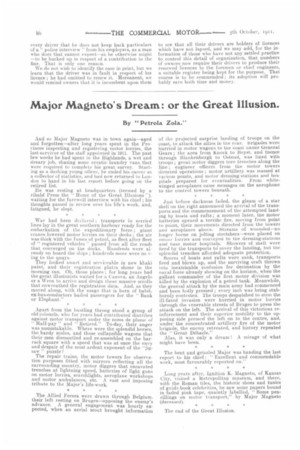Major Magneto' s Dream: or the Great Illusion.
Page 2

If you've noticed an error in this article please click here to report it so we can fix it.
By " Petrola Zola."
And so Major Magneto was in town again—aged and forgotten—after long years spent in the Provinces inspecting and registering motor lorries, the last survivor of the staff appointed in 1911. The past few weeks he had spent in the Highlands, a wet and dreary job, chasing some erratic laundry vans that were required to complete his great survey. Starting as a dashing young officer, he ended his career as a collector of statistics, and had now returned to London to hand in his last report before going on the retired list.
He was resting at headquarters (termed by a ribald Press the " Home of the Great illusions "), waiting for the farewell interview with his chief ; his thoughts passed in review over his life's work, and, fatigued, he slept.
War had been declared ; transports in serried lines lay in the great southern harbour ready for the embarkation of the expeditionary force ; giant cranes lowered motor lorries on their decks; the air was thick with the fumes of petrol, as fleet after fleet of " registered vehicles passed from all the roads that converged on the docks. Hundreds were already on board the ships ; hundreds more were nu vmg to the quays. They looked smart and serviceable in new khaki paint, and their registration plates shone in the morning sun. Oh, those plates ; for long years had the great illusionists waited for a Canova, an Angelo or a Wren to arrive and design those massive scrolls that enwreathed the registration data. And, as they moved along, with the usage that is born of habit, ex-bus-conductors hailed passengers for the " Bank or Elephant."
Apart from the hustling throng stood a group of old colonels, who for years had contributed diatribes against motor transport under the noins de plume 1)r " Half-pay " and " Retired." To-day, their anger was unmistakable. Where were the splendid horses, the hardy mules, and those collapsible wagons that their men dismantled and re-assembled on the barrack square with a speed that was at once the envy and despair of the most ardent exponent of the "jigsaw" puzzle ?
The repair trains, the motor towers for observation purposes fitted with mirrors reflecting all the surrounding country, motor diggers that excavated trenches at lightning speed, batteries of light guns on motor lorries, searchlights, aeroplane workshops and motor ambulances, etc. A vast and imposing tribute to the Major's life-work.
The Allied Forces were drawn through Belgium, their left resting on Bruges—opposing the enemy's advance. A general engagement was hourly expected, when an aerial scout brought information
of the projected surprise landing of troops on the coast, to attack the allies in the rear. Brigades were hurried in motor wagons to the coast under General Gears ; the area from Ithock to Heyst, and thence through Blankenbergh to Ostend, was lined with troops ; great motor diggers tore trenches along the line ; engineer officers from the motor towers directed operations ; motor artillery was massed at various points, and motor dressing-stations and hospitals prepared for eventualities. From whitewinged aeroplanes came messages on the aerophone to the control towers beneath.
Just before darkneas faded, the gleam of a star shell on the right announced the arrival of the transports and the commencement of the attempted landing by boats and rafts ; a moment later, the motor batteries opened a terrific fire, moving from point to point, their movements directed from the towers and aeroplanes above. Streams of wounded—no longer borne on jolting stretchers—were placed on mobor lorries and conveyed to the dressing-stations and base motor hospitals. Showers of shell were fired by the transports to' cover the landing, but the splendid trenches afforded adequate protection. Scores of boats and rafts were sunk, transports fired and blown up, and the surviving craft thrown into inextricable confusion for decimation by the naval force already showing on the horizon, when the gallant commander of the first motor division was killed by the explosion of a petrol tank. Meanwhile, the general attack by the main army had commenced and been hotly pressed ; every inch was being stubbornly contested. The troops despatched to stem the ill-fated invasion were hurried in motor lorries through the venerable streets of Bruges to press the attack on the left. The arrival of this victorious reinforcement and their superior mobility to the opposing side pressed the left on to the centre, and, under the concentrated artillery fire of the motor brigade, the enemy retreated, and history repeated the " Great Debacle."
Alas, it was only a dream 1 A mirage of what might have been.
The bent and grizzled Major was handing the last report to his chief : " Excellent and commendable work, most favourably reported on."
Long years after, Ignition K. Magneto, of Kansas City, visited a Metropolitan museum, and there, with the Roman tiles, the historic shoes and tunics of guide-book celebrities, he saw some papers bound in faded pink tape, quaintly labelled, "Some pencillings on motor transport," by Major Magneto (deceased).
The end of the Great Illusion.






















